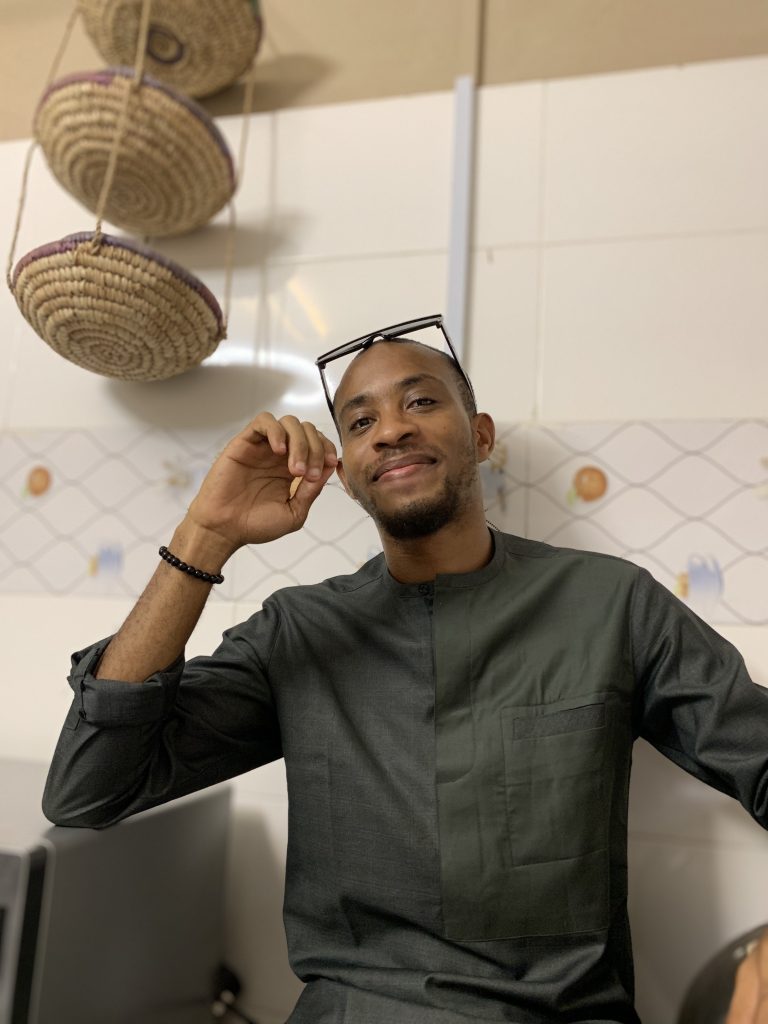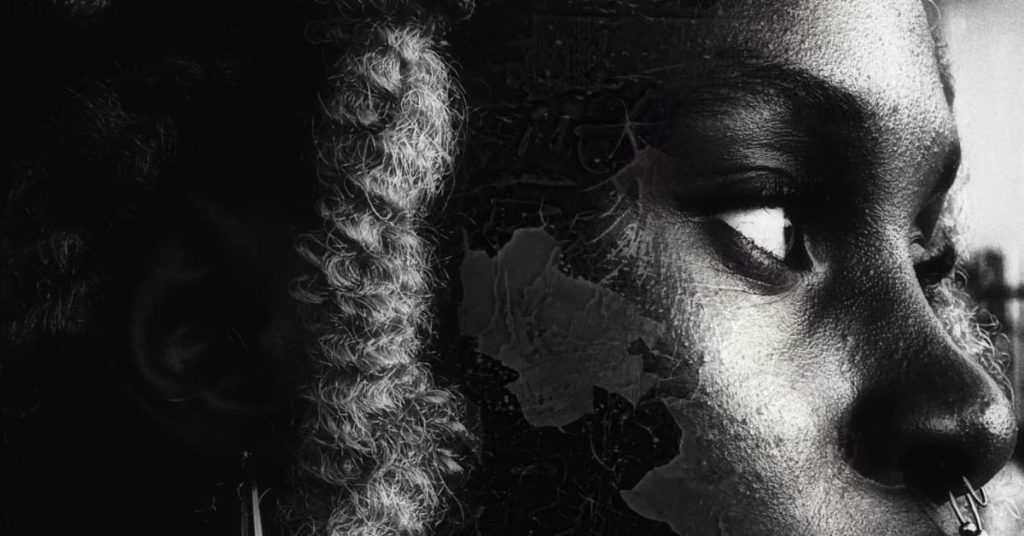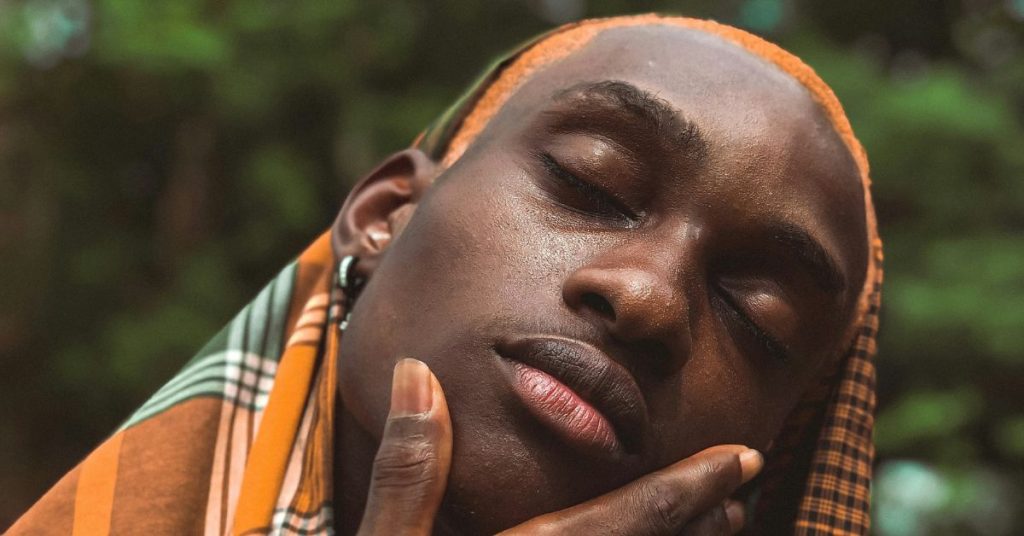Cover Image: Nsikan Abasi
1
“You get conditioned to it and confused by it, and then you don’t know what’s going on.” – Patricia Evans
Obum had his own way of showing love. He paid my school fees and offered advice I never asked for—always in that firm voice that expected no reply. I never doubted that he loved me deeply, perhaps too deeply. But in loving me, he broke me. Shattered me into a thousand pieces. Now, I gather myself in fragments—never whole—only remembering who I used to be in slivers of silence.
Mama married Obum in 1997. It was a small wedding, just a few extended and nuclear family members who adored them both. I’ve seen the pictures. She wore white lace and a shy smile. But every step she took toward the altar was a quiet surrender.
In marrying him, she traded her confidence for peace, her dreams for his ambitions, her long, flowing braids for plain all-back cornrows—and sometimes, a slap or two if her voice got too loud.
Oh, Tiwalade, little did she know what love would cost her. We lived in a modest compound in Iwaya, Yaba—right in the throbbing heart of Lagos. Our flat was a two-bedroom unit in a semi-detached bungalow built in the late ’80s, with cement walls faded by harmattan dust and zinc roofing that groaned like an old man each time the rain fell.
The parlor was the heart of it all—small, dim, and always warm. The walls were painted a tired yellow, chipped like old teeth, and dressed with calendar posters, faded wedding photos, and that familiar portrait of a blue-eyed Jesus, staring down with eternal patience.
The brown chairs sagged in the middle like backs burdened by years, arranged neatly around a center table covered in crochet lace that Mama washed every Saturday, no matter how tired she was. White linen doilies perched delicately on the armrests, smoothed and ironed with care, as though they too had to keep up appearances.
A ceiling fan hung in the center of the room, spinning lazily like it had something to say, though it barely stirred the thick heat. And when NEPA took the light—as they always did—the fan stilled mid-whirl, and sweat began its slow crawl down our backs. We’d open the narrow slatted windows, hoping for breeze, for mercy, for anything.
Against the wall stood a wooden shelf—a shrine of some sort. Mama’s Chinua Achebe novels sat there, their spines bent like prayerful hands. Family albums, edges curling, held photos we rarely opened but never dared to throw away. A carefully kept collection of classic Igbo gospel video tapes—Chinyere Udoma, Princess Njideka Okeke, Reverend Fr Mbaka—played every Sunday after Mass.
And there, in the center of it all, sat the Panasonic color TV on its wooden stand—stoic, proud, loyal. It only obeyed when we twisted the antenna wire just so, usually with foil wrapped tight at the tip like a magic charm.
The corridor stretched thin and dim, leading to the bedrooms and the kitchen. The kitchen itself was no bigger than a closet. You had to turn sideways if someone else was inside. Aluminum pots were stacked in a corner like silver trophies of resilience. The kerosene stove, blackened at the base, sat on a short wooden stool. Nearby, a small cupboard held reused plastic containers and a cluster of old kom kom filled with salt, maggi cubes—sometimes dry pepper. The smell of kerosene lived in the cracks of the walls.
The backdoor opened to the bathroom and toilet we all shared. The toilet was tiled halfway up the wall and always slick with moisture—cold on your bare feet. The air smelled of soap and something old. Two giant blue drums stood in the corners like sleeping giants. We fetched water into them from the compound tap, one paint bucket at a time, and covered them to keep the mosquitoes out. It was routine. Silent. Sacred. Nobody complained.
And yet, despite the peeling walls, the cramped rooms, the sweltering heat, that house was home. It held Mama’s hums—soft, almost prayerful—as she went about her day. The sharp clatter of spoons during Sunday lunch. The scent of Air Wick hung in different rooms. The sound of the louver blades tapping gently when the wind passed through. And always, the weight of silence when he was home.
You could feel it. Like a shadow that stretched across the whole house.
You could feel his silence before you even saw him—thick and choking, like smoke filling the room. I remember how the children, myself included, would slip quietly into our rooms without a word, pretending to read or sleep, trying to disappear.
My older cousins, Uncle Obi and Aunty Tó, avoided his eyes like they were dangerous, their hands suddenly busy with pointless tasks—folding clothes, stirring pots that didn’t need stirring—anything to keep from meeting his gaze. It was as if staying busy was the only way to stay out of his way, to keep the silence from turning sharp. No one ever said they were afraid, but I knew. We all did.
I remember one Sunday—April 2003. The sun was cruel that day, the kind that made the zinc roof hot enough to fry an egg. I was sitting in the parlor, peeling boiled eggs. The rice was on the stove, and the fish stew was already scenting up the house.
My Grandma was in the kitchen, humming something low. From the bedroom came the muffled rise of voices. Another argument. Same rhythm: his voice thunder, hers a quiet resistance.
Let’s call him Mpa. That’s what we called him anyway.
2
“We teach girls to shrink themselves, to make themselves smaller. We say to girls, you can have ambition, but not too much. You should aim to be successful, but not too successful. Otherwise, you would threaten the man” – Chimamanda Ngozi Adichie
Marriage often looks beautiful on the outside.
The smiling family portraits. The coordinated same ankara to church on Sunday mornings. The way husband and wife walk out of church hand in hand, faces glowing, bodies aligned like everything is in order. And when someone asks how life is going, the wife smiles, soft, practiced and says, “We thank God.”
But that’s only what people are allowed to see.
No one tells you what happens after the guests leave. After the lights are turned off and the doors are shut. When it’s just two people in a house, surrounded by expectations, silence, and regret.
That’s when it begins.
The slow unraveling.
Not in a dramatic moment, but in the everyday things, the conversations that never happen, the apologies that never come, the dreams that are quietly or violenty abandoned.
You see, ideal Nigerian marriages are not just unions. They are cages wrapped in celebration. Places where love turns into duty. Where women are taught to bend, to shrink, to endure, all in the name of respect and peace.
Submission is called virtue. Suffering is renamed strength.
And a woman’s worth is measured by how much she can survive without ever asking to be saved.
Sometimes, I look at Mama’s old pictures and I mourn.
Not just for the woman she was, bright-eyed and hopeful, but for the woman she never had the chance to become. In those faded photos, she’s glowing, chin tilted slightly like she knew the world owed her joy. But that world lied. The walls of our living room still hold echoes of her laughter before it became a polite chuckle, a forced hush – the kind that doesn’t reach the eyes. If you listen closely, you might hear the ambition that once bubbled in her voice when she talked about her work, before it was buried beneath wrappers and baby bottles.
But society was unkind to women who wanted more. They called them selfish. Rebellious. Ungrateful. They begged them to stay, to “endure it” for the children. To “manage him.”
“Nne, you need to learn how to manage your husband,” Aunty Chikodi would say, the edges of her head-tie always too tight, as if they held her own secrets in place. “Don’t say things that will get him angry.”
This same woman whose children showed up at school with new bruises every term, all explained away with stories of clumsiness. I sometimes wonder what she’s still managing, the beatings or the shame. Her husband, a known cheat, still strutted like a peacock in the area, his shirt always crisply ironed, his sins always ignored.
It’s unfortunate how Mama listened. She cried. And she listened. When she should have fought. When she should have raised hell, thrown plates, packed her bags and said, “To hell with you.”
That Sunday, the argument started quietly, like the slow rumble of thunder before a storm. The afternoon sun poured through the parlor windows in long golden strips, lighting up the dust particles floating in the air like tiny ghosts.
Outside, the scent of burnt offering from our neighbor Mama Paulina’s kitchen drifted in, we called it that because something was always burning. Rice, stew, beans… she didn’t discriminate. To her, smoke was just part of the flavor.
But inside, the air was heavy, the kind of heavy that sits on your chest and dares you to breathe.
Mpa was shouting down the house. His voice bounced off the cement walls, growing louder with each accusation.
“You don’t care about this house! Your office is more important than your family!”
I sat at the edge of the corridor, that same narrow stretch that always felt too long when fear walked with you. The air was stale, tinged with the faint sting of kerosene and the ghost of yesterday morning’s cleaning. I pressed my eye to the tiny holes in the wooden door, the one with the Catholic harvest stickers and a hinge that creaked as though it had stories to tell but was too tired to speak. My heart pounded, loud and frantic.
Mama stood at the edge of the bed, arms crossed, her brown head-tie already loosened, a strand of hair clinging to her sweaty forehead. She looked small, not because of her height, but because she was slowly disappearing into herself.
She argued back, desperation threading through every word. Her lips trembled, her hands shook, but her voice was a river that refused to run dry.
“I love my job, Obum. I have worked too hard. I’ve given this family everything. I have dreams too.” She said it like someone clinging to the last threads of who she used to be.
But Mpa didn’t see her. Not really. He didn’t see the woman standing there, barely holding herself up. He didn’t hear the tremble in her voice, or notice how each word tasted like fear. He looked at her and still missed her completely. What he saw was a challenge. An opponent. A woman forgetting her place.
His jaw clenched. His breath came hard through flared nostrils. And in that terrible stillness, that split second where everything seemed to hold its breath, the air felt heavy with anger.
Then his hand moved. The slap tore through the silence like a rupture. Not just a sound, but a shift. Mama’s head snapped sideways, her earrings flung off like startled birds. She didn’t cry. Not at first. She just stood there, stunned, lips parted, one eye swelling before my eyes. Then tears came – hot and helpless, spilling down her cheeks like betrayal made visible.
But she kept talking. Kept defending herself. Her dignity spilling out with every word, as if words could save her.
So he silenced her the only way he knew how. His thick fingers closed around her neck, squeezing until the veins in her temple screamed. He slammed her against the wall. The calendar behind her fluttered, a helpless witness to the violence.
“I’m the head of this house! You will not disrespect me!” Her legs buckled. Her body trembled. Her eyes – my God, her eyes – looked like they were trying to run away. Still, she found her voice.
“Kill me o! Kill me! Shebi that’s what you want!” she screamed, her voice breaking. She sounded like a woman who had nothing left to lose.
Mpa paced the room like a mad prophet, veins on his neck pulsing with fury. “You want to disgrace me, abi? So the neighbors will hear? You won’t tell them the one you did o!”
“What did I do, Obum?” she wailed. Her voice, though hoarse and wounded, had steel in it. “Z’am okwu biko, is it a crime to be a woman?”
If I were older, I’d have whispered: purr. Because it takes guts to ask that. But to Mpa, a woman who stood her ground was a curse. And when she didn’t shrink, when she refused to kneel beneath the weight of his voice, something inside him snapped into stillness. A terrible, unnatural stillness.
He muttered beneath his breath, the words thick and slurred, impossible to catch and somehow that made it more frightening. Then he moved toward her, slowly, deliberately, with eyes that didn’t look like his own.
He sat beside her. Just like that. Like nothing had happened. Like he hadn’t just thrown her against a wall and cracked her dreams open on the floor. He reached for her back and rubbed it with the clumsiness of guilt, not tenderness, no – guilt. That stiff, hollow kind. His hand moved in lazy, mechanical circles. Not comforting. Not loving. Just… movement.
The room felt cold. Still.
Mama sat like the bed was both a relief and a burden, leaning slightly to one side, one hand pressed against her lower back, the other resting protectively over her belly. Her shoulders trembled, and a bead of sweat slid down the side of her face, catching on the curve of her jaw.
She didn’t cry. She didn’t flinch. She didn’t speak. Her silence was loud. And then, just when it seemed the house had gone still, like even the walls were listening, Mpa said it:
“Ị ga-ahapụ ọrụ ahụ. Ị ga-anọkwa n’ụlọ.” “You’ll quit the job. You’ll stay home.”
It landed softly.
But it felt like a blade.
Mama blinked. Once. Slowly. Then something broke behind her eyes. Not tears, at least not yet, something deeper. Like a part of her had finally heard what the rest of her body had been trying to ignore.
She turned to him, her voice hoarse and shaking like wind against a broken window.
“No, Obum. A si’m mba,” she said, loud enough to echo in the walls. Her voice cracked, raw like torn fabric. “I said no.”
It wasn’t just refusal. It was mourning. The kind of ‘no’ a woman says when she’s choosing to live, even if it kills her. And he didn’t like that. Not one bit. His jaw tightened. His breathing changed. Something dark crawled back into his eyes, a storm returning with vengeance.
He grabbed her by the hair – hard – yanked her head back as though her defiance offended the air he breathed. He cursed her. Cursed her parents. Cursed the very womb that bore her, forgetting, or refusing to remember, that the woman who carried that womb lived quietly with us, her ears still sharp despite the years. Grandma had only stepped out to see a friend on the next street, but even her absence wasn’t enough to protect her from his tongue.
Mama didn’t move. Didn’t speak. She just stayed there, stomach rising and falling, one hand twitching lightly at her side like her body wanted to protect itself before her mind could catch up.
Mpa’s breath was heavy now. He paced once, then twice, like he was looking for a place to pour the rest of his rage. And then he did. The slap came so suddenly, so violently, it bounced off the ceiling. She didn’t scream. She groaned. Low. Animal-like. Then he shoved her onto the bed, the faded blue one, neatly made but rumpled, creaking softly under her weight.
He climbed on top of her and unleashed fists to her arms, her back, her legs, wherever his rage landed. The mattress thumped. The bed screamed beneath them. And Mama… Mama screamed too. But not just from pain.
She screamed from betrayal. From loss.
From the horror of realizing that the man she loved, the man who once traced gentle patterns on her hand to calm her fears, who used to quietly sneak into her hostel room just to see her, was the same man who now beat her like a drum to silence her soul.
I could hear it all from the corridor. Every slap, every sob, every muffled cry beneath his weight. And I could do nothing. I was just a child hiding in the shadows, clutching my knees, willing the day to end.
When he felt he’d done enough, he adjusted his shirt like he’d just returned from a jog. He stormed out, slamming the door so hard the windows shook. I ran to the toilet and locked myself in, pressing my face into my palms. I cried silently. Because I didn’t want to be next.
By the time I came out, the neighbours had already gathered, pushing through the door like a flood of panic. Mama was slumped in their arms, her body limp like wet cloth. Her face - oh God - her face was unrecognizable. One eye swollen shut, lips cracked and bleeding. There was blood on her wrapper too, dark and soaking through, spreading like it had something urgent to say before it dried.
She was clutching her stomach with both hands, holding it tight, like she could will the pain to stop, like she could keep the life inside from slipping away.
Tears poured freely down her face, but her sobs came in stutters. Not loud. No. The kind that hurt more because she was trying to stay quiet, to stay alive. She winced as they moved her, gasping sharply like the air itself was cutting through her.
“Nwa’m o… my baby…” she kept whispering, her voice so hoarse it barely sounded like her. Again and again. “My baby… my baby…”
Like maybe if she said it enough, the child inside would hear her and hold on. Oh, to lose your child and your dreams in one day.
They said she had a miscarriage. Said it like the child gently slipped away in the dark. Not that it was beaten out of her. Nobody said “assault.” Nobody said “violence.” Nobody said “Obum did this.” Not even Mama. She just lay there in that hospital bed, eyes hollow, lips trembling. She stared at the ceiling like it held answers. She didn’t even cry anymore. I think the tears had abandoned her, too. She held my hand once. And with a voice as thin as spider silk, she whispered, “You’ll understand when you’re older.” But I didn’t want to understand. I wanted her to run. To scream. To throw her ring at his feet and drag me into a better life. But she returned.
The world outside remained quiet. The neighborhood unchanged. Birds chirped. Children played. A sermon crackled from a radio in someone’s house — “Husbands, love your wives…” the preacher said, oblivious to the irony, to the cruelty pulsing just a wall away. Inside, Mama was silent now. Not from peace. But from depletion. The kind of silence that isn’t rest, but resignation. Like a flame that knows it’s no longer welcome. And the worst part? No one came. No one fucking came. Not her friends. Not Aunty Chikodi. Not the church women who clapped and danced beside her every Sunday in their CWO wrappers. They saw the makeup. The sunglasses. The extra scarves on hot days. And they chose not to ask. Because asking makes you responsible. And here, responsibility for a woman’s suffering always falls back on her.
So Mama stayed. Stayed because of us. Because of shame. Because culture told her that leaving was failure. That survival was scandal. That her body, her bruises, her brokenness, were all crosses she was meant to carry in silence. And so she did. Until silence became her language. Until her laughter became a memory. Until even I, her child, began to forget what her joy once sounded like. But I haven’t forgotten everything. No. I remember that no. That final no. And someday, if the time comes, when I stand at the edge of my own storm, I will remember it again. And I will not stay. I will not shrink. I will not manage. Because I am my mother’s daughter and I heard her when she said no, even if the world didn’t.

Ogochukwu Idiagbor is a lawyer and creative writer. He enjoys using storytelling to capture the struggles and triumphs of everyday life. His work is inspired by a deep curiosity about people and their stories.
Because great writing shouldn’t be hard to find. Subscribe to get the best reads in your inbox.




